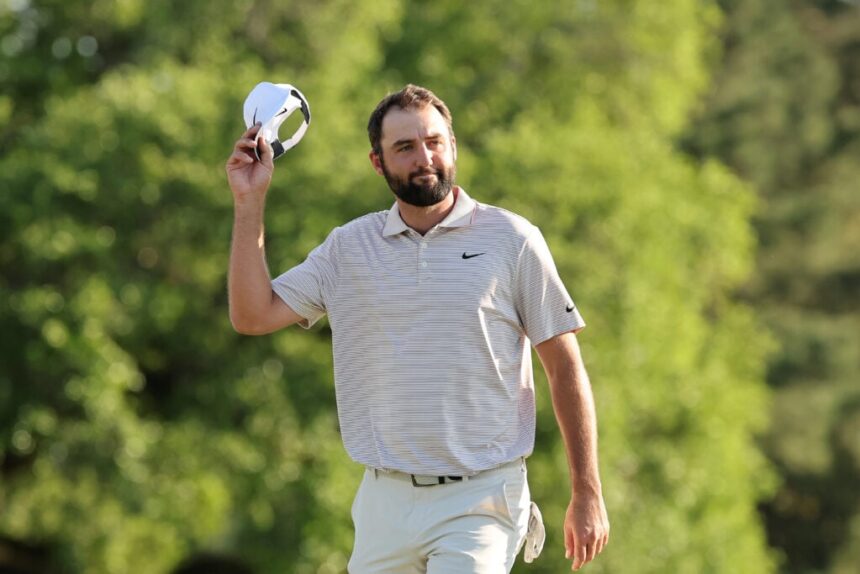Scottie Scheffler, the number one-ranked golfer in the world, remains winless in 2025.
Scheffler endured a disappointing Masters at Augusta. The two-time champion was short of his exceedingly high standards throughout the competition, and despite rallying to finish fourth on Sunday, never threatened the top of the leaderboard at the climax of the action.
He has an opportunity to get his 2025 on the right track this week, as he tees off in the RBC Heritage as the reigning champion.
But he may want to re-read the rule book before beginning his opening round. Scheffler was caught off guard in a recent interview when asked about a new rule introduced for the tournament.
Scottie Scheffler reacts to new PGA Tour rule for RBC Heritage
The new rule allows rangefinders into the RBC Heritage. They hope that by introducing the measuring devices into competition, they can improve the pace of play.
The PGA Tour has come under scrutiny surrounding slow play in their competitions. However, not only does Scheffler not believe the rule change will make marked improvements to the speed of rounds, he also forgot about the new rule altogether.
“You’re not going to like this answer, but I kind of forgot about that,” he laughed when asked about the use of rangefinders.
“Is it going to help the pace of play? Maybe by a few minutes. Will it be anything significant? No.
“In this tournament what significantly affects the pace of play is the walkability of the golf course, and I think we’re playing twosomes all week which means we’ll be going from playing five hour rounds to four hours or less.
“When you see the biggest changes in pace of play, it all comes from going from three guys to two guys in a pairing. It’s just easier to get around the golf course.
“Also, the distance walking from green to tee is a big factor as well if you’re going to save 15 to 20 minutes off the round. This golf course is pretty simple in terms of getting around.”
Scheffler, when later asked what would make the biggest impact on pace of play, had his own suggestion.
“I think the only way to have a significant impact on the pace of play, if you look at the average round time last week, Thursday and Friday you’re playing in threes, Saturday and Sunday you’re playing in twos. There’s going to be a significant difference, probably over an hour difference in pace of play.”
Ultimately, it seems that Scheffler forgot about the rule change because he doesn’t think it matters. He went on to discuss why he believes the pace of play conversation is irrelevant to the wellbeing of golf.
“The pace of play debate is funny. I think people want to watch exciting golf – I think that’s what it’s all about. Let’s say if we do all these changes and we save 20 minutes off of a round of golf. Is somebody going to sit down on the couch on Sunday and go, well, I didn’t have five hours to watch a round of golf, but I’ve got four hours and 40 minutes. Now I’m in!
“If we’re going to spend a lot of this time and energy, I’d want to spend it on getting more people involved in the sport of golf.”
Collin Morikawa has already spoken on rangefinders
Collin Morikawa weighed in on the rangefinder debate back in February before the Genesis Invitational at Torrey Pines, and found himself largely in agreement with Scheffler.
“It helps more from the fact when you’re out of position,” stated Morikawa, a six-time PGA Tour winner. “Like, not really in the fairways, I don’t think it’s going to change anything.
“I don’t think it’s the end solution to changing our pace of play from if you had five hours and 20 minutes to four and a half hours, right? It’s not going to shave 45 minutes off our time for pace of play.
“I know a lot of people complained when we were or when the Tour was here a few weeks ago how slow it was, but when you have a course in front of you that is that difficult and the winds are up and the conditions are that tough, it’s just going to play slower, like there’s no way around it.
“I get it, guys are slower than others and sometimes it takes too long, but tough conditions make it play slower no matter what. It’s going to happen that way.”
Andy Weitz, the PGA Tour’s Chief Marketing and Communications Officer, explained the Tour’s decision to trial rangefinders at the RBC Heritage in February.
“We want to better understand how being out of position, how the ability to better understand the distance can not only increase the pace of play potentially but also send a signal to our fans that we are evolving and use of these modern devices could be a fit for the PGA Tour on a permanent basis in the future.”
But perhaps, by putting so much thought into how they can improve the pace of play, they would be better off thinking whether they should.
Rory McIlroy’s grand slam-winning Masters round took around five hours to complete. There were no widespread complaints about the speed of the round and pace of play.
Instead, people were hooked onto every second, the anticipation of forthcoming shots only fuelling the excitement and anxiety of the moment.
Admittedly, that was a once-in-a-lifetime moment. We witnessed history that day. But this point remains valid: if viewers are captivated, there will not be complaints about the time it takes to complete a round.
In that sense, it is difficult to disagree with Scheffler. The game would benefit not from rangefinders, but from compelling storylines, competitive tournaments and high-class golf.
The post Scottie Scheffler admits he ‘forgot’ new PGA Tour rule change ahead of 2025 RBC Heritage appeared first on HITC.
